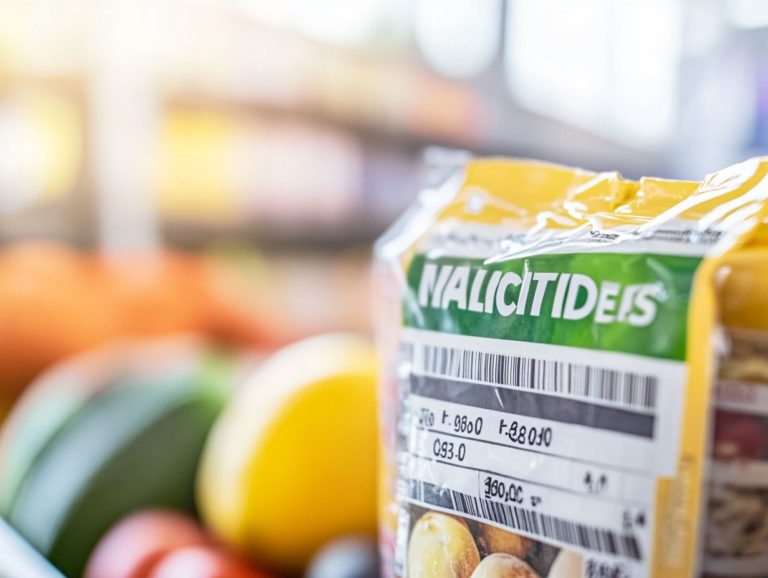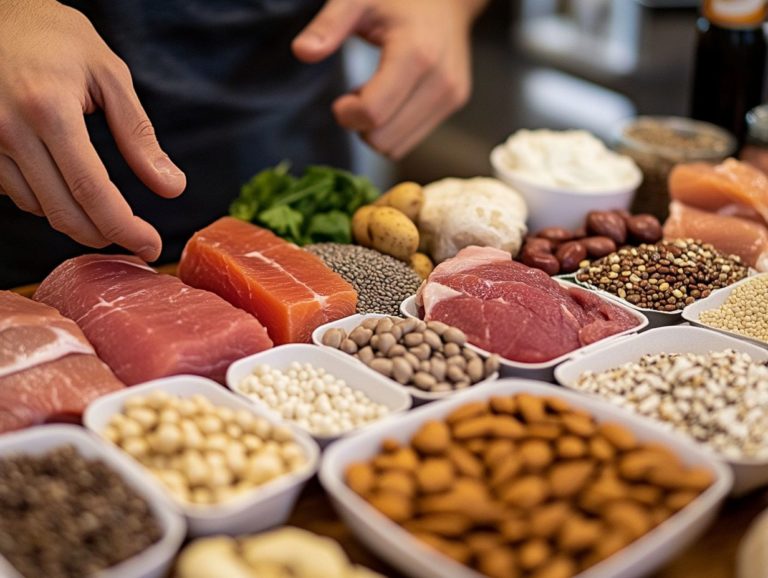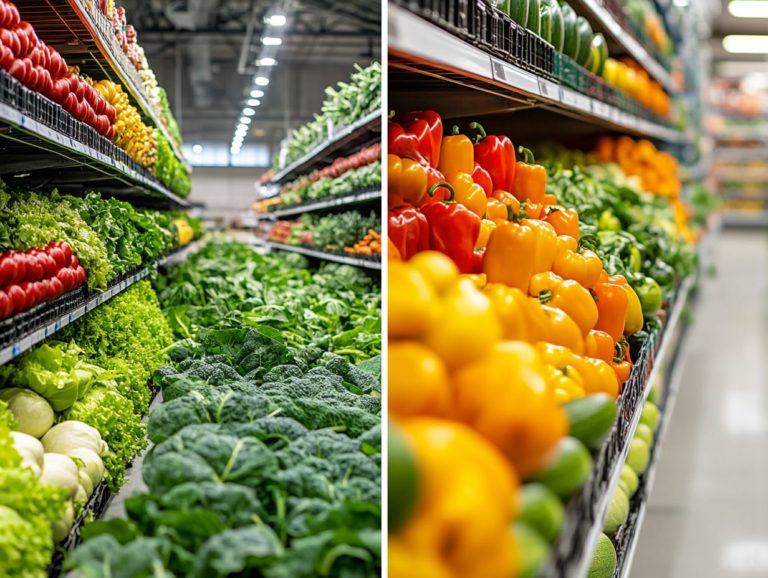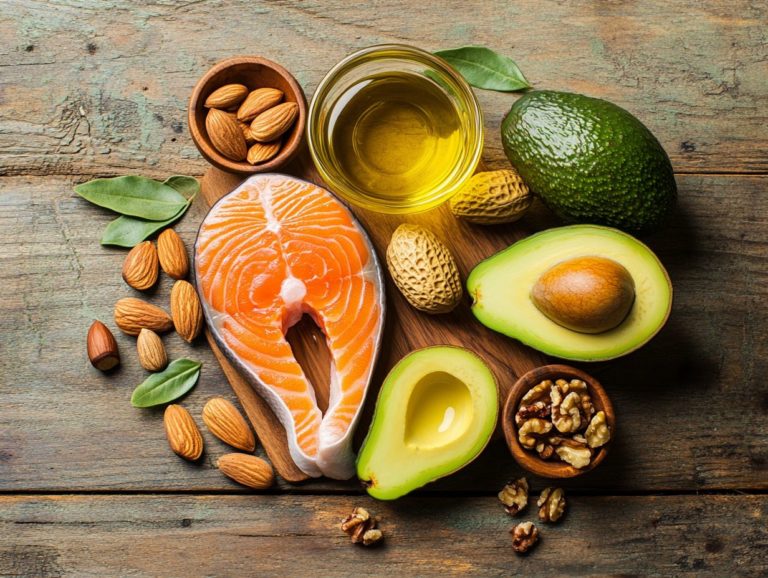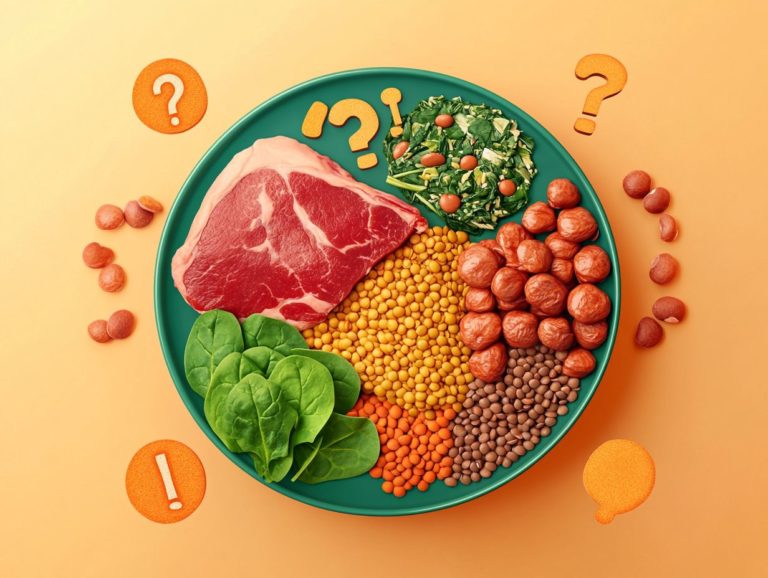5 Myths About Eating for Energy
In our fast-paced world, energy is essential. Yet, many of us struggle to maintain it throughout the day.
With so much conflicting information about nutrition, it’s easy to buy into myths about food and energy.
You might think that skipping meals boosts productivity or that energy drinks are a healthy way to recharge. These misconceptions can mislead you.
This article reveals five common myths about eating for energy, clarifies the truths behind them, and offers tips for healthier eating habits that promote lasting vitality.
Get ready to challenge what you think you know and discover the secrets to maintaining your energy levels!
Contents
- Key Takeaways:
- 1. Skipping Meals Can Give You More Energy
- 2. Energy Drinks Are a Healthy Way to Boost Energy
- 3. Carbs Are the Enemy of Energy
- 4. Eating a Big Meal Will Give You Energy
- 5. Supplements Are the Key to Sustained Energy
- What Are the Best Foods to Eat for Sustainable Energy?
- Frequently Asked Questions
Key Takeaways:
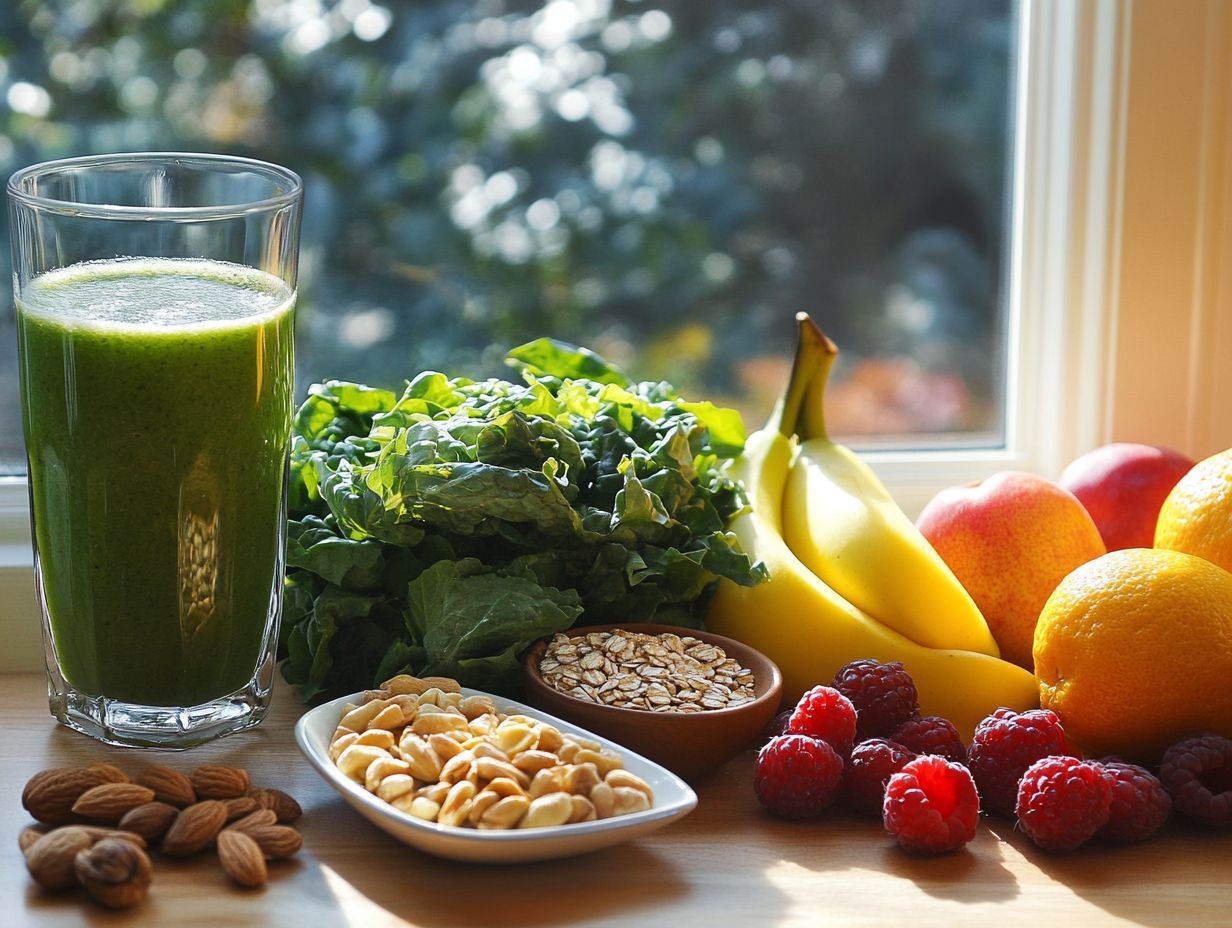
Skipping meals can actually decrease your energy. Your body needs a steady intake of nutrients to stay energized.
Energy drinks may give a temporary boost, but they aren’t a healthy or sustainable option. Stick to natural sources like fruits and vegetables.
Carbs are vital for energy. Choose complex carbohydrates like whole grains instead of simple sugars.
1. Skipping Meals Can Give You More Energy
Many believe that skipping meals boosts energy, but this idea contradicts the basics of healthy eating. Balanced meals are crucial for sustained energy and overall well-being.
Well-rounded meals with complex carbohydrates, protein, and healthy fats enhance energy. Complex carbs, like whole grains, release energy steadily, while proteins help repair and build tissues.
Healthy fats in foods like avocados and nuts provide essential nutrients and keep you feeling full. Relying on processed foods can lead to energy crashes, especially that dreaded mid-afternoon slump.
Instead of enhancing vitality, skipping meals or snacking on processed foods often leaves you feeling drained. Informed nutritional choices are key!
2. Energy Drinks Are a Healthy Way to Boost Energy
Energy drinks might seem like a quick fix for low energy, but they often contain high calories and processed ingredients. This raises important questions about their role in a healthy diet.
These drinks often have added sugars and artificial substances, causing your energy to spike and crash shortly after. This rollercoaster can leave you feeling more exhausted.
Natural sources of energy, like whole fruits, nuts, and seeds, offer a more balanced energy release without negative side effects.
By adding these nutrient-rich foods to your diet, you boost energy in a way that supports health and vitality.
3. Carbs Are the Enemy of Energy
Many believe that carbs harm energy levels, but this myth overlooks the importance of complex carbs and whole grains in providing sustained energy.
Unlike simple carbs that spike and crash blood sugar, complex carbs digest slowly, keeping you energized and satisfied throughout the day.
Whole grains such as brown rice, quinoa, and oats are rich in fiber, vitamins, and minerals, supporting digestion and overall health. Guidelines suggest at least half your grains should be whole grains.
Emphasizing nutrient-dense foods can enhance your energy management and promote overall wellness.
4. Eating a Big Meal Will Give You Energy
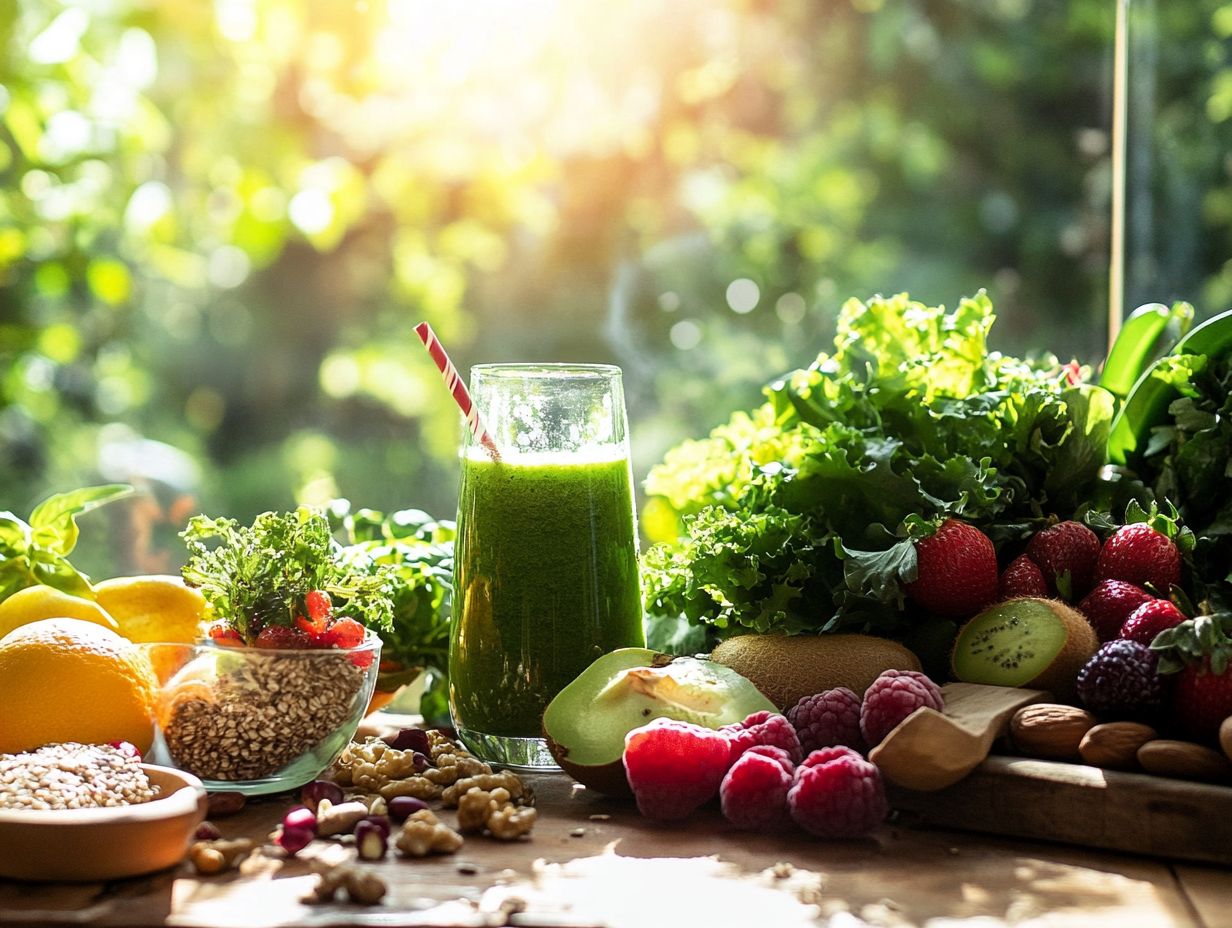
Many believe a big meal provides an immediate energy boost. However, your body often responds with a wave of tiredness instead.
This happens because digestion takes a lot of blood flow away from your muscles and brain. This leads to that familiar post-meal slump.
To avoid this, focus on moderate meal sizes. Combine proteins, complex carbohydrates, and healthy fats for steady energy.
For example, grilled chicken, quinoa, and avocados promote a slow release of energy. This helps you dodge those annoying energy dips after heavy meals.
5. Supplements Are the Key to Sustained Energy
Some think supplements are the secret to lasting energy. In reality, you need a well-rounded diet full of whole foods, vitamins, and minerals.
When you depend solely on pills, you might miss out on the rich nutrients found in whole foods. Fresh fruits, colorful vegetables, whole grains, lean proteins, and healthy fats provide essential vitamins for energy, plus fiber and antioxidants.
These nutrients boost metabolism and support your energy levels naturally. By choosing nutrient-dense foods, you ensure your body gets the nourishment it needs.
This approach to nutrition is simply unmatched.
What Are the Best Foods to Eat for Sustainable Energy?
Want to keep your energy up? Focus on a variety of nutrient-rich foods!
Complex carbohydrates, proteins, healthy fats, and plenty of fruits and vegetables work together to fuel your body efficiently.
Whole grains like quinoa, brown rice, and oats are excellent sources of complex carbohydrates. They offer a steady release of energy.
Lean proteins such as chicken, beans, and tofu are important for muscle repair and energy. Don t forget healthy fats from avocados, nuts, and olive oil; they support brain health and stabilize energy.
A colorful mix of fruits and veggies think berries, spinach, and sweet potatoes provides essential vitamins and helps prevent fatigue. This way, your body stays at its best.
How Does Proper Nutrition Affect Energy Levels?
Proper nutrition shapes your energy levels. A balanced diet rich in vitamins, minerals, and whole grains gives your body the power to convert food into energy efficiently.
Carbohydrates are vital as they serve as your main energy source. Foods like oats and brown rice release energy steadily and help keep blood sugar stable.
Incorporating protein-rich foods like lean meats, fish, and legumes is crucial for muscle repair and endurance, especially if you re active.
Don t forget healthy fats from avocados and nuts; they offer lasting energy. Vitamins, especially B vitamins, are key for energy production, helping your body extract energy from food.
What Are the Negative Effects of Believing These Myths?
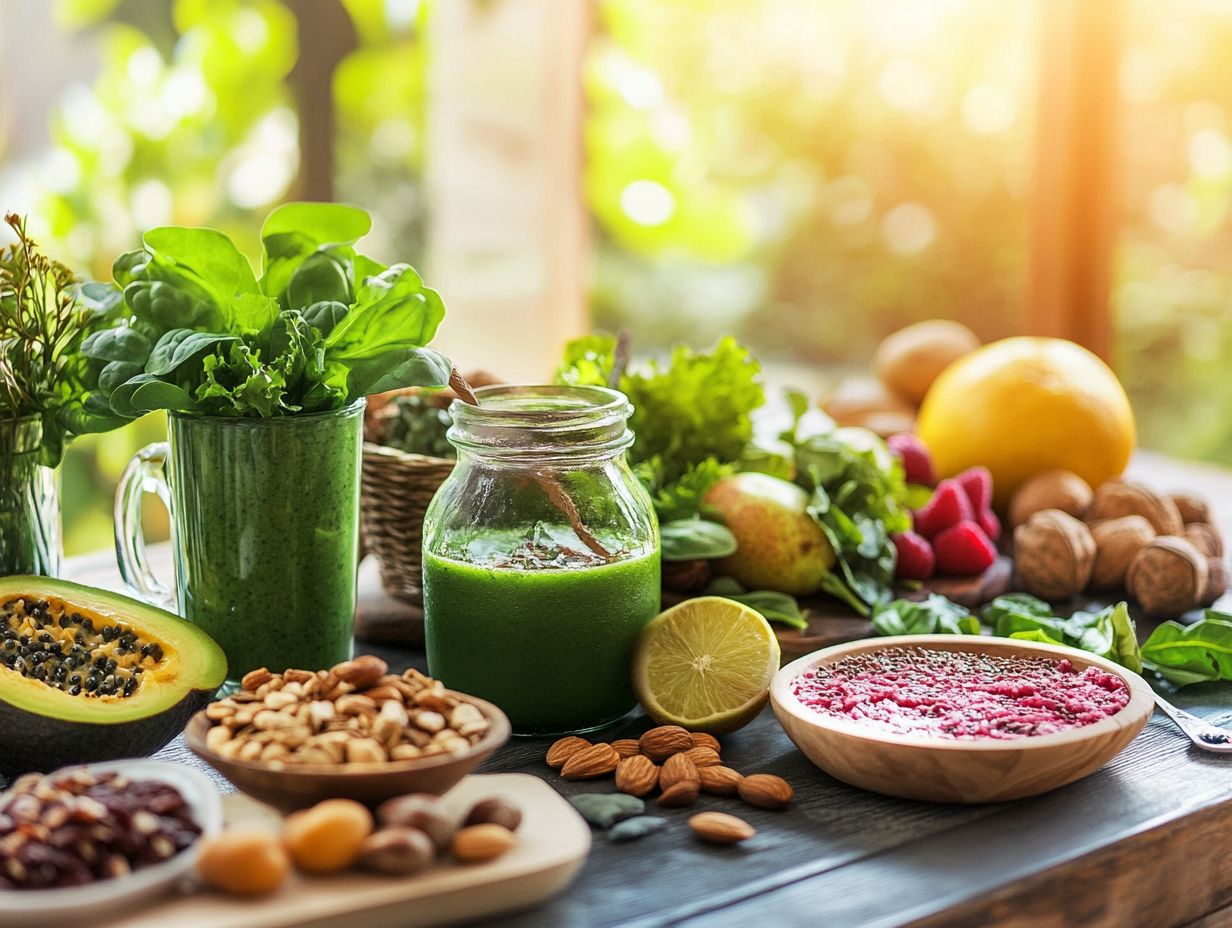
Believing in common nutrition myths can lead to misguided dietary choices that leave your energy levels in the lurch. These myths promote unhealthy eating habits, favoring processed foods over nutrient-dense options.
Misconceptions often arise from media portrayals or misleading information that oversimplifies complex dietary advice. It’s easy to fall into traps that prioritize quick fixes over sustainable nutrition.
Take, for example, the belief that all carbohydrates are harmful. This may lead you to shun healthy whole grains, which are vital for providing long-lasting energy. Similarly, believing that skipping meals is a surefire way to lose weight can result in unhealthy snacking later, ultimately compromising your nutrient intake.
Debunk these myths and embrace balanced nutrition to make informed decisions that truly support your health and well-being. When you embrace this approach, you’ll feel energized and ready to tackle anything!
How Can One Incorporate Healthy Eating Habits for More Energy?
Incorporating healthy eating habits into your daily routine is essential for boosting energy levels. It encourages you to consume the right mix of carbs, proteins, and fats, ensuring your body has the fuel it needs to perform at its best.
Start your day with a wholesome breakfast that combines oats, nuts, and fresh fruit. This delightful mix offers a balance of slow-releasing energy and vital nutrients.
As the morning unfolds, snacking on yogurt enriched with seeds can provide a satisfying boost while keeping hunger at bay.
For lunch, enjoy a vibrant quinoa salad brimming with mixed greens, chickpeas, and avocado. Not only does it tantalize your taste buds, but it also fuels your body with enduring energy.
When that afternoon slump rolls around, reach for apple slices paired with almond butter a snack that packs in protein and healthy fats, ensuring you remain energized until dinner.
What Are the Common Misconceptions About Eating for Energy?
Common misconceptions about eating for energy often lead you astray, promoting unhealthy diets and habits that fail to support sustained energy levels. It’s important to debunk these ideas, such as those found in the article on 5 myths about the Mediterranean diet.
Some think loading up on sugar or processed foods gives a quick energy boost, but it often results in a sharp energy crash soon after. This misjudgment can create a cycle where sugary snacks replace nutrient-dense foods that genuinely replenish your energy reserves.
The belief that all fats are harmful may lead you to avoid healthy fats found in avocados or nuts both essential for optimal brain function and enduring energy.
These misconceptions can ultimately lead to poor dietary choices, negatively impacting your mood, focus, and productivity throughout the day.
Is There a One-Size-Fits-All Approach to Eating for Energy?
When it comes to nutrition and energy levels, there’s no one-size-fits-all solution. Your dietary needs can fluctuate significantly based on factors like age, activity level, and health conditions.
Recognizing this variability is vital for crafting a personalized nutrition plan that adheres to broader guidelines but adapts to your unique lifestyle.
If you require a boost in energy for athletic performance, your dietary mix will differ from someone focused on weight management or managing a chronic illness. By considering your preferences and specific needs, nutrition can become a powerful tool for achieving and sustaining optimal health.
Tailoring your dietary choices enhances your commitment and cultivates a deeper connection to your overall well-being.
Frequently Asked Questions

1. What are the common myths about eating for energy?
Here are a few common myths that could be holding you back from true energy: the belief that carbohydrates are bad for energy, that skipping meals can boost energy, and that eating small meals throughout the day is necessary for energy.
2. Are all carbohydrates bad for energy?
No, not all carbohydrates are bad. Complex carbohydrates, like whole grains and vegetables, provide lasting energy. Simple carbohydrates, such as sugar, can cause quick crashes.
3. Does skipping meals boost energy levels?
No, skipping meals can harm your energy levels. It often results in low blood sugar and fatigue, making it harder to stay energized.
4. Should I eat small meals throughout the day?
Not necessarily. Some people find smaller, more frequent meals help maintain energy. Others prefer larger meals less often. It’s about what works best for you.
5. Is caffeine a good energy source?
Caffeine can give a quick boost, but it isn t a reliable energy source. Too much can lead to jitters and energy crashes.
6. Can protein help boost energy levels?
Absolutely! Protein-rich foods like lean meats, eggs, and beans provide essential nutrients. These help keep your energy up all day.

